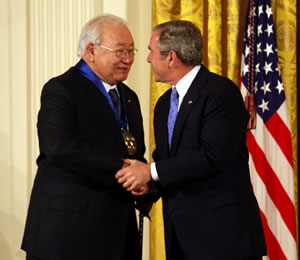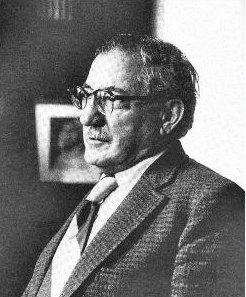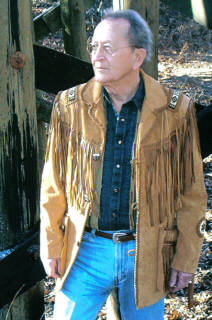
John Ernst Steinbeck was an American writer. He won the 1962 Nobel Prize in Literature "for his realistic and imaginative writings, combining as they do sympathetic humor and keen social perception". He has been called "a giant of American letters."

Gerald Robert Vizenor is an American writer and scholar, and an enrolled member of the Minnesota Chippewa Tribe, White Earth Reservation. Vizenor also taught for many years at the University of California, Berkeley, where he was Director of Native American Studies. With more than 30 books published, Vizenor is Professor Emeritus at the University of California, Berkeley, and Professor of American Studies at the University of New Mexico.
Carter Curtis Revard was an American poet, scholar, and writer. He was of European American and Osage descent, and grew up on the tribal reservation in Oklahoma. He had his early education in a one-room schoolhouse, before winning a Quiz Bowl scholarship for college, subsequently attending University of Tulsa for his BA.

Navarre Scotte Momaday was an American novelist, short story writer, essayist, and poet. His novel House Made of Dawn was awarded the Pulitzer Prize for Fiction in 1969, and is considered the first major work of the Native American Renaissance.

Medicine River is a novel written by author Thomas King. It was first published by Viking Canada in 1989. The book was later adapted (1993) into a television movie starring Graham Greene and Tom Jackson.

(Helen) Diane Glancy is an American poet, author, and playwright.
Gregory Michael Sarris is the Chairman of the Federated Indians of Graton Rancheria and the current Chair of the Board of Trustees of the Smithsonian's National Museum of the American Indian. Until 2022, Sarris was the Graton Rancheria Endowed Chair in Creative Writing and Native American Studies at Sonoma State University, where he taught classes in Native American Literature, American Literature, and Creative Writing. He is also President of the Graton Economic Development Authority.
Craig Womack is an author and professor of Native American literature. He self-identifies as being of Creek and Cherokee descent, but is not enrolled with any Native American tribe. Womack wrote the book Red on Red: Native American Literary Separatism, a book of literary criticism which argues that the dominant approach to academic study of Native American literature is incorrect. Instead of using poststructural and postcolonial approaches that do not have their basis in Native culture or experience, Womack claims the work of the Native critic should be to develop tribal models of criticism. In 2002, Craig won Wordcraft Circle Writer of the Year Winner. Along with Robert Allen Warrior, Jace Weaver and Greg Sarris, Womack asserted themselves as a nationalist, which is part of an activist movement. The movement significantly altered the critical methodologies used to approach Native American literature.

William D'Arcy McNickle was a writer, Native American activist, college professor and administrator, and anthropologist. Of Irish and Cree-Métis descent, he later enrolled in the Salish Kootenai nation, as his mother had come to Montana with the Métis as a refugee. He is known also for his novel The Surrounded.

Jim Weaver McKown Barnes is an American writer who was born near Summerfield, Oklahoma. He received his BA from Southeastern State University and his MA and Ph.D. from the University of Arkansas. He taught at Truman State University from 1970 to 2003, where he was Professor of Comparative Literature and Writer-in-Residence. After retiring from Truman State, he was Distinguished Professor of English and Creative Writing at Brigham Young University until 2006. On January 15, 2009, Barnes was named Oklahoma Poet Laureate for 2009–2010. He describes his ancestry as "an eighth Choctaw" and "a quarter Welsh".
Anna Lee Walters is a Pawnee/Otoe–Missouria author.
Allison Adelle Hedge Coke is an American poet and editor. Her debut book, Dog Road Woman, won the American Book Award and was the first finalist of the Paterson Poetry Prize and Diane DeCora Award. Since then, she has written five more books and edited eight anthologies. She is known for addressing issues of culture, prejudice, rights, the environment, peace, violence, abuse, and labor in her poetry and other creative works.
Robert DeMott is an American author, scholar, and editor best known for his influential scholarship on writer John Steinbeck, winner of the Pulitzer Prize for The Grapes of Wrath (1939), and the Nobel Prize for Literature in 1962.
Peter Iverson was the Regents Professor of History (Emeritus) at Arizona State University. Iverson received his B.A. in 1967 from Carleton College; his M.A. in 1969, and Ph.D., 1975, from the University of Wisconsin–Madison where he studied with Al Bogue, Robert Berkhofer, Catharine McClellan, and Herb Lewis. He was awarded the Guggenheim Fellowship in 1999 and served as the President of the Western History Association. His primary area of research is Native American history in the 20th and 21st centuries.
Elias Lee Francis III was an American poet of Native descent, educator, and founder of the Wordcraft Circle of Native Writers and Storytellers.
Kenneth Morrison Roemer, an Emeritus Professor at the University of Texas at Arlington, an Emeritus Fellow, UT System Academy of Distinguished Teachers, and a former Piper Professor of 2011, Distinguished Scholar Professor, and Distinguished Teaching Professor at the University of Texas at Arlington. He is the author or editor of four books on utopian literature, including The Obsolete Necessity (1976), nominated for a Pulitzer, and three books on American Indian literatures, including the co-edited Cambridge Companion to Native American Literature (2005). His collection of personal essays about Japan, Michibata de Dietta Nippon (2002) (A Sidewalker’s Japan), was a finalist for the Koizumi Yakumo Cultural Prize. He is the project director of a digital archive of tables of contents of American literature anthologies Covers, Titles, and Tables: The Formations of American Literary Canons.

Bearheart: The Heirship Chronicles is a 1990 novel by Gerald Vizenor; it is a revised version of his 1978 debut novel Darkness in Saint Louis: Bearheart. The novel is a part of the Native American Renaissance and is considered one of the first Native American novels to introduce a trickster figure into a contemporary setting. Vizenor drew from trickster traditions from various Native American tribes, such as Nanabozho (Anishinaabe) and Kachina (Pueblo).
Arnold Krupat is an American academic who is a retired emeritus professor of literature at Sarah Lawrence College in Bronxville, New York. His academic work focuses on Native American literature and is informed by critical theory.

Donald Fixico is a Native American American writer and intellectual. He is a Distinguished Foundation Professor of History at Arizona State University. Previously, he was the Thomas Bowlus Distinguished Professor of American Indian History, CLAS Scholar and the founding Director of the Center for Indigenous Nations Studies at the University of Kansas.

Co=ge=we=a, The Half-Blood: A Depiction of the Great Montana Cattle Range is a 1927 Western romance novel by Mourning Dove, also known as Hum-Ishu-Ma, or Christine Quintasket. It is one of the earliest novels written by an indigenous woman from the Plateau region. The novel includes the first example of Native American literary criticism.









